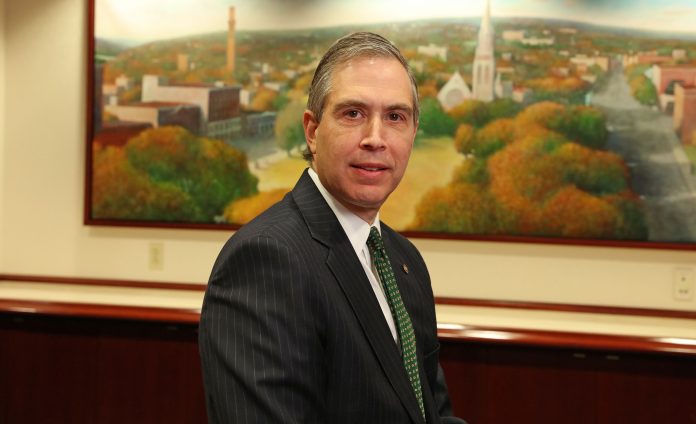
When John R. Ciulla became CEO of Webster Bank at the beginning of 2018, he was just the third chief executive in the bank’s 82-year history, and the first one who was not a member of the Smith family. Prior to joining the bank in 2004, Ciulla worked for The Bank of New York as well as being a practicing attorney in New York.
PBN: Given Webster Bank’s longtime control by its founder, Harold Webster Smith, and his son, James C. Smith, how much are you wedded to the legacy of the Smith family in terms of the bank?
CIULLA: That’s a great question. I think there are a number of aspects to that. … In 2016 we completed our largest strategic review that we had ever done with the help of outside consultants, and we did it at a time of financial strength, which I think sometimes is unusual. But I led that. It was part of the overall succession planning over the last three or four years, and I had an opportunity to really put my fingerprint on the strategic plan.
So we’re very much aligned as an executive and management team with the strategic plan. We’re two years into it, and [it calls for] aggressively growing [Health Savings Account] bank, expanding the commercial bank, continuing to optimize and transform the community bank to changing customer preferences on the retail banking side and aligning our wealth offerings. Everyone in the bank for the last year or so has understood that we came out of that review with those strategic priorities. And so strategically, there’s very little change.
And I’m always careful to say, I’m not just sort of staying on the same course because of respect for the legacy. It’s because it was a really well thought-out strategic plan with Jim [Smith] involved as CEO and with me as president, and quite frankly with the other executive leaders. So, strategically, you won’t see much of a pivot.
People always ask me the question, is there a lot more pressure not being a Smith and being the third CEO. I really feel like it’s a competitive advantage, because what the legacy of Jim and his dad give us is this incredible cultural strength. When people join us, they tend not to leave. We attract good people, we care about our people. We‘ve got a great culture that cares about community, we respect each other. It’s almost a family business-type culture, and so I feel that is a competitive advantage and I’m not apt to change aspects of that cultural advantage.
So where I get to to your question is probably going forward, one of the things I always talk about is the nine worst words in business are “That’s the way we’ve always done it here.” I do think I’ll bring maybe more of a focus on changing, whether it’s internal processes, whether it’s changing things we need to do, whether it’s accelerating investment in digital or mobile because we have to. I’d say that it’s more of a tactical and a future vision on not being wed to the way we do things and maybe being a little bit more aggressive on some of the strategic changes and accelerating those all in line with our strategic initiative.
PBN: In today’s health care environment, how difficult is it to grow the HSA bank?
CIULLA: It probably will get more complex over time. Remember, we’re among the largest single-line custodians of HSA accounts, measured by number of accounts or total deposits. So what we’re doing is obviously taking advantage of a market that’s growing significantly. We can influence that market by building out sales, by being really good at what we do, by having good functionality.
But in essence that market sort of grows itself, because in order to have people take more ownership over their health care dollars, and quite frankly, employers and health care providers pushing people toward high-deductible health plans, HSA is a great, tax-advantaged tool to do that.
We’re capturing a lot of the market as we move forward by blocking and tackling, taking advantage of our market position and obviously investing in the business. … We think there have been legislative discussions about doubling the amount of the contribution, decoupling it from high-deductible health plans as a way to put more of the burden, onus and opportunity on individuals to use those tax-advantaged dollars to be better consumers of health care. We think it’s good for the future of the country to do that.
So I think HSA accounts will always be really important. … And I don’t know if you saw [recently], JPMorgan, Amazon and Berkshire Hathaway, they are going to try and circumvent the traditional health care system. My guess is although they have announced it to benefit their employees, if Jeff Bezos is involved, they will probably want to roll it out, right, at some point? So I do think that we’ll have to navigate being more than just a custodian of health savings accounts, because I think the whole health care ecosystem will continue to evolve, and if you don’t figure out where you are in that position and if we continue to build out product offerings and ancillary products, we will need to navigate that health care ecosystem. But for now we are in a very good position.
PBN: You recently closed two Rhode Island branches and one in Fall River. But you have purchased a number of branches up in the Boston area. What does that mean for Rhode Island and Bristol County compared with your other markets?
CIULLA: We are constantly evaluating our entire footprint, and what you’ve seen if you look at what we’ve done in some markets where we have acquired branches more recently, we’ve repositioned branches. We’ve tried to lower square footage in the system.
PBN: Why is that?
CIULLA: It’s not efficient. The days of the 5,000-foot branch in terms of foot traffic and necessity is just not there. So what we’re doing is making banking centers smaller, looking for new banking centers in areas of opportunity where we have density. [Where we have] certain dynamics and performance elements in certain banking centers, we may consolidate. And we have done a good job of keeping customers both at Webster and happy when we have closed banking centers.
We know that based on customer behavior, it used to be a much shorter distance where you were worried about consolidating and that people wouldn’t travel. But because people visit the banking centers generally less than they used to, you can have a very good network if your online is strong and your mobile is strong and your digital is strong.
So what I would say is we’re constantly evaluating every banking center in our footprint, not with an ultimate goal to shave 5 percent, shave 10 percent. It’s not a cutting exercise. But it is an exercise to make sure we are making our banking centers the most efficient, that they look nice and they are in the right places. So I think you will continue to see us consolidate, open, make smaller in all of our markets, although we have no additional plans right now in this market to consolidate branches.
PBN: Some banks see Rhode Island as relatively flat in terms of growth. Do you see Rhode Island similarly or do you see there being an upside for the kind of banking that you offer?
CIULLA: We think there is an upside. And we look at our markets holistically. So across retail banking, small business, which we call business banking, middle market and corporate banking, sponsored specialty banking, commercial real estate and private banking.
[Douglas E. Scala] is our regional president here. Doug has several jobs. He also sort of runs regionally, even outside the state, middle market. And I will tell you that we’ve had disproportionate growth here in our middle market business banking and corporate banking when compared on a relative basis to our core market of Connecticut, for instance. I would say in the last couple of years from a growth perspective, [this market has had] a faster growth trajectory than Boston. And so really we’ve seen Providence and New York City probably in the commercial banking sphere as two key geographies of growth.
I think it’s a function of some of Connecticut’s challenges from an economic perspective. I think it’s also a function of the fact that we have a significant market share in Connecticut. So once you’ve deployed in a slower growth market, it’s harder.
We had a great regional president here, Bob Twomey. We kind of joined at the same time. Bob’s one of my favorite people in the world. And he really did a great job of putting us on the map and building infrastructure with Virginia Roberts and other folks. And Doug has sort of taken that and built upon it and hired some new RMs and the growth trajectory over the last couple of years has been really strong.
So we look to Doug not to just sort of go along but we think the greater Providence and southeastern Mass. market is a good growth market for us, particularly on the commercial banking side and business banking side.
Mark S. Murphy is the editor of Providence Business News.












